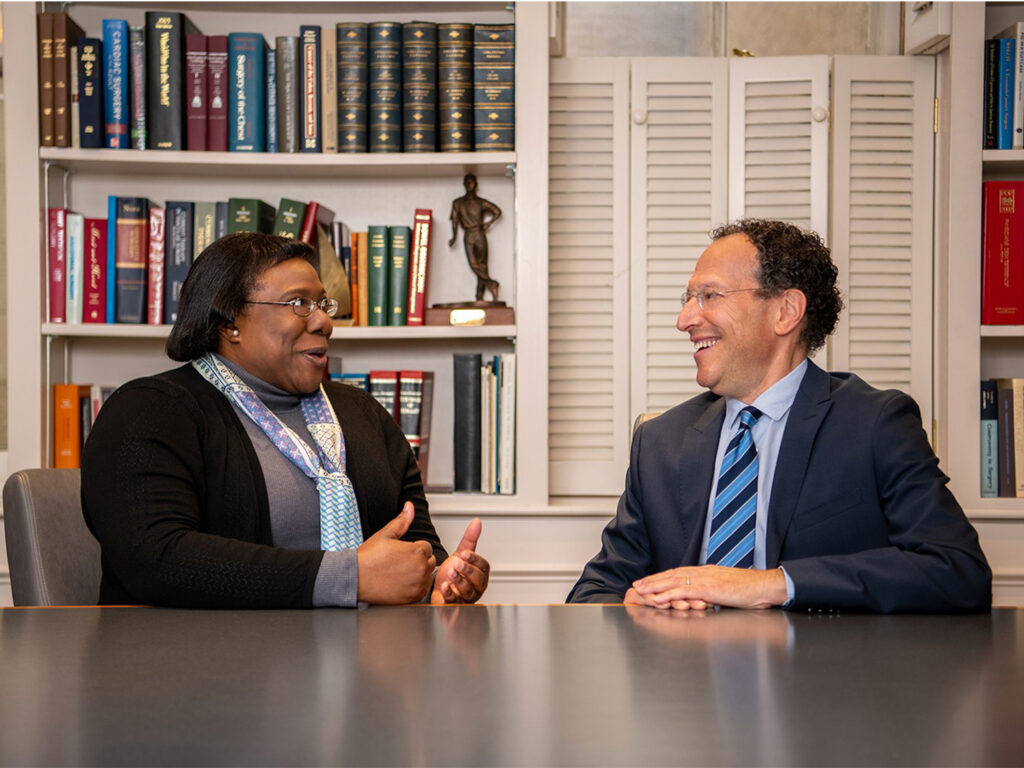The parents of Massachusetts General Hospital psychiatrist, Simmie Foster, MD, PhD, were no strangers to struggle — her mother is of Eastern European Jewish descent and her father is of African American descent, from Georgia. They ran multiple small businesses and were perennial students, committed above all else to educating their children, who grew up seeing examples of resilience and strength often surrounded by desperation and societal malfunction.
Dr. Foster was three when she asked her father, “Dad, what am I made of?” He replied, “Simmie, my love, you are made of thousands of little Simmies called ‘cells.’” Thus began the odyssey of Dr. Foster and her quest to understand resilience at a cellular level. This resilience, she argues, is the key to robust mental health. In an era where mental health challenges loom large, her work offers new perspectives on treatment and prevention.
When she was nine, and living in Richmond, California, Dr. Foster joined a performing arts center devoted to social justice and healing. This experience later led to her questioning of the commonly held belief in strict division between the mind and the body, and opened her mind to diverse ancient practices of healing.
“Ancient practices of well-being, such as sauna bathing and cold-water swimming, can now be understood at a cellular level, bridging the gap between cellular biology and clinical practice with groundbreaking research into simple, accessible practices that could transform our approach to mental healthcare,” says Dr. Foster.
Dr. Foster Asks Questions
Dr. Foster entered the University of California at Berkeley at age 16, where she embarked on a journey to explore how cells remember pain and adapt to it. This exploration was not initially geared toward psychiatry, but a pivotal experience with talk therapy opened her eyes to its potential and changed the trajectory of her life.
In 2010, while at Yale University, she became an expert on immunology, earning her doctorate and medical degrees. Here, she began to formulate the foundational questions of her career:
- How do the immune and nervous systems communicate with each other?
- What does the essence of resilience and regeneration look like when written in the molecular language of cells?
- How do ancient practices such as meditation, yoga and temperature therapies improve well-being at a cellular level?
Hot and Cool Research
Today, Dr. Foster is head of the Laboratory for Hot and Cool Research at Mass General, where her team studies the effect of temperature and heat flows on body, mind and mood.
“There is an epidemic of chronic inflammatory diseases and their comorbidities; most conspicuously long COVID, depression, cardiovascular disease and Alzheimer’s,” says Dr. Foster. “Given that current treatments for these disorders aren’t very effective, we are seeing a significant resurgence in patients using methods such as cold plunges and saunas to stay healthy or help improve their symptoms.”
Dr. Foster notes that anecdotal evidence shows that brief exposure to temperature extremes — hot or cold — can reset the immune response and relieve multiple inflammatory symptoms. “We don’t fully understand how this works or how to choose the right treatment for the presenting symptoms,” she says. “Our goal through continued research, is to understand how we can tailor hot and cold treatments to relieve chronic inflammation and its attendant illnesses.”
To that end, Dr. Foster is currently running clinical trials of whole-body hyperthermia (using a medical-grade sauna to elevate body temperature to a mild fever range) for patients with depression and long COVID. The molecular outcomes of these trials will help to refine these treatments and help guide personalized therapy. Next, she plans to expand to cold exposures.
Dr. Foster’s Laboratory for Hot and Cool Research is creating new understanding on the cascading effects of temperature changes from the molecular to the whole-body level, systematically making the anecdotal evidence, scientific, and thus, medically relevant.
To learn more about how you can support the Mass General Department of Psychiatry, please contact us.





